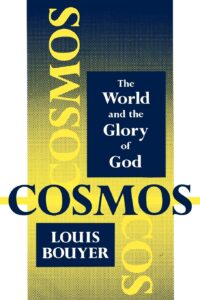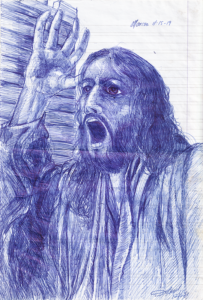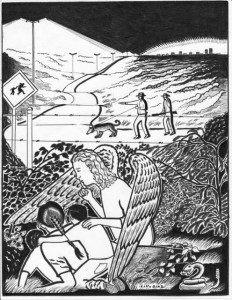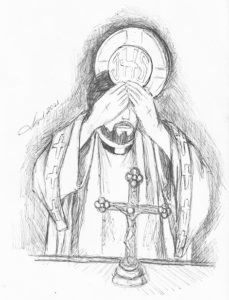 The great interest in the cosmos today, from the Big Bang theory to new discoveries and wonders of science, the galaxies revealed in new telescopes, new awareness of the mysteries of the animal world, and the whole world, is inspiring people to celebrate the wonders of the universe. Along with these awe-inspiring discoveries is a renewed interest in cosmology – a branch of metaphysics and astronomy that deals with the nature and origin of the universe.
The great interest in the cosmos today, from the Big Bang theory to new discoveries and wonders of science, the galaxies revealed in new telescopes, new awareness of the mysteries of the animal world, and the whole world, is inspiring people to celebrate the wonders of the universe. Along with these awe-inspiring discoveries is a renewed interest in cosmology – a branch of metaphysics and astronomy that deals with the nature and origin of the universe.
The threats to our physical world, the wars and divisions, the plight of refugees across the globe, the stockpiling and sale of dangerous weapons, and uncontrolled technology, however, are hard to understand in the light of God’s plan for his creation. As the glory of the cosmos reflects God’s glory, surely our love for God and all that God has created should follow. Instead, we sometimes seem to be trying to destroy the world and its creatures.
As we at the Houston Catholic Worker have been reading together Pope Francis’ Laudate Deum (his new Apostolic Exhortation on the climate crisis and our suffering planet), and as we have been trying to cope with the many refugees at our doors, I turned to Louis Bouyer, and his book Cosmos: the World and the Glory of God to reflect in the light of faith on what is happening around us and where to place our hope.
In his book Bouyer reflects on God’s plan for the creation of the cosmos, on how the Bible (the story of the cosmos) came to be written, on the good and the fallen among the angels and humanity, the Incarnation and Redemption, and on cosmic liturgy.
We hope and pray that the wisdom of Bouyer may help us to recognize the glory of the cosmos, how it is being ruined, and how it can be redeemed.
Like the words of Bouyer, Pope Francis in Laudato Si gives us hope and reassures us on God’s plan for the cosmos: “The Creator does not abandon us; he never forsakes his loving plan or repents of having created us. Humanity still has the ability to work together in building our common home” (#13).
The Mystery of Iniquity
Contemplation of the wonders of the universe brings us to reflect on the difficult question of how there can be so much destruction of persons, of creation, so much evil and suffering. As he reflects on the cosmos Bouyer asks, “Why are we and the universe with us under the sway of the powers of evil?” He reflects on what St. Paul describes aa the mystery of iniquity.
Many of headlines in our newspapers or sites on the world wide web illustrate the problem of iniquity in our world today:
The Mystery of Iniquity in Today’s Headlines
Twelve Billionaires’ Climate Emissions Outpollute 2.1 Million Homes, Analysis Finds
Migrants Risk the Dangerous Trip to the U.S. Because It’s Safer Than Staying at Home
How the World’s Two Largest Polluters, U.S. and China, Stack Up
More Than 100 Million People Forcibly Displaced: UNHCR Report
Some Climate Impacts are Already So Severe They Cannot be Adapted
Whales are the Largest Consumers of Plastic Waste
Few Willing to Change Lifestyle to Save the Planet, Climate Survey Finds
World War III May Have Already Started
Religion Against the Machine: Pope Francis takes on AI
Two Views of the World in the Bible and in Church Teaching
How are Christians to understand and relate to the world? Bouyer presents two views from the Bible.
Sometimes it seems that in the Bible “the world” denotes the universe “which remains alien or even hostile.” This is the sense in the words of the First Epistle of St. John: “Do not love the world or the things in the world… for the whole world is in the power of the evil one.” Elsewhere, on the contrary, God’s love for the world is strongly expressed: “For God so loved the world that he gave his only Son, that whoever believes in him should not perish but have eternal life.” Again according to St. John, but this time in the Gospel (Bouyer, p. 3).
These two contrasting views of the world presented in the Bible remind us that God did not want the iniquity we see around us in his creation.
Do the Principalities and Powers Mentioned in the Bible Actually Exist?
We are all familiar with the story in the book of Genesis of the Fall of Adam and Eve and their loss of the Garden of Eden. From the very first, there were divisions and Bouyer describes not just the one Fall, but several Falls: The first when some of the angels fell and turned against God, then the fall of humankind, the fall of the cosmos itself, the time of Noah and the flood, and the Tower of Babel.
Bouyer says, “The fall of a large number of angels made them the first evildoers. Man, by following their suggestion, was included in their degradation, along with the earth from which man had been drawn and which had been entrusted to him” (91-92). From the beginning of the universe, these hostile powers were in a “mortal struggle” against God. Bouyer points out that in each case creatures set themselves up in opposition to God, trying to be gods themselves.
With the Incarnation Jesus went out into the desert and there was tempted by Satan. Bouyer writes: “There is an obvious correlation between this temptation and the original fall of man, as described in Genesis. This time, however, man emerges victorious. The hymn in Philippians 2 acclaims Jesus as the new Adam”… who “chose faithfulness to the Fatherly Word rather than surrender to the blandishments of the tempter, and in so doing exposed Satan’s snares for all time.” In spite of this, the temptations to want to run the world continue today.
According to Bouyer, iniquity still exists in the one called by St. Paul in II Corinthians “the god of this world who is obviously the serpent of Genesis, Satan, Job’s accuser and tempter, the apocalyptic Belial.”
During the 1970s, some who had seemed to endorse Catholicism lite or Christianity lite suggested that we not speak any more of principalities and powers, fallen angels, sin or Satan. That was old-fashioned. Some of our readers may remember Fr. Daniel Berrigan, who prophetically spoke and acted against the United States’ involvement in the Vietnam War. As we talked with Fr. Dan in the early 1970s. he reminded us that it was impossible not to realize, in the light of world events, that what the Scriptures said about principalities and powers is true.
Bouyer reminds us that demonic spirits have been overcome by Christ on his cross. We know that the Kingdom of God is already here, in us through the Spirit, and in the Lord before his Passion and glorification. But as Bouyer also reminds us, “it ‘suffereth violence,’ i.e., it is hidden by the still persisting externals of Belial’s reign.”
It would seem that “persisting externals of Belial’s reign” conspire still in the struggle of goodness against iniquity, between light and darkness – in the very threats to our physical world, the wars and divisions, plights of refugees, and uncontrolled technology mentioned at the beginning of this article.
Detachment and Voluntary Poverty vs. Avarice and Seeking Power
We know in our hearts that Christ has overcome sin and death. We ask ourselves how we can best participate with him in overcoming the iniquity in the cosmos. As Catholic Workers we were struck by Bouyer’s statement that, “Man can recover true life and preserve the cosmos only by rediscovering that a certain voluntary poverty is the condition for possessing the word in a way that will not reduce it to ashes.” (160) Bouyer is speaking here, as did Peter Maurin and Dorothy Day, of the detachment taught to Christians from the time of the early Church.
In a consumer culture, often this vision of voluntary poverty is lost. Bouyer recounts that in earlier centuries, human persons saw the world “as a meaningful cosmos oriented toward transcendence, a sense of which had previously been imparted to our lives by contemplation of the universe.” As early as the fifteenth century, though, and in the following centuries, “we see Christianity degenerate into a mere support or cover for a society which followed instead the bourgeois ideal in a society ‘based directly and perhaps exclusively on money.’”(122)
Bouyer starkly declares that “Wealth became the supreme means of gaining, in this world, not only a much coveted (through rarely if ever attained) security, but also what was to be called comfort… This new civilization was progressively to inactivate all specifically Christian characteristics, simply by substituting the worship of Mammon for that of Christ, while maintaining Christian forms “ (p. 121-122).
This worship of money (avarice, one of the capital sins) is directly related to the destruction of the cosmos through pollution, green house gases, overuse of plastics and other harmful chemicals, the development and sale of terrifying weapons, and for example, the exploitation of the earth to the detriment of poor workers. Few in power are willing to sacrifice their wealth.
Pitfalls in Technique and Technology
 Already in 1982 Bouyer published his critique of technology in Cosmos: “Evidence of this explosive and demonic progress of a technology that is good in itself toward an exclusively technological ideal is shown in the increasing tendency to substitute a wasteful economy of conspicuous consumption, destructive of natural resources, for the various economies, now considered obsolete, which allowed or positively promoted renewal of these recourses, by respecting the natural rhythms of plant and animal life.” A danger is that “Not only does it replace the original vitality of the cosmos with an accumulation of machines—in fact turning the entire cosmos and all human society into a monstrous machine operating to no useful purpose.”— P.158
Already in 1982 Bouyer published his critique of technology in Cosmos: “Evidence of this explosive and demonic progress of a technology that is good in itself toward an exclusively technological ideal is shown in the increasing tendency to substitute a wasteful economy of conspicuous consumption, destructive of natural resources, for the various economies, now considered obsolete, which allowed or positively promoted renewal of these recourses, by respecting the natural rhythms of plant and animal life.” A danger is that “Not only does it replace the original vitality of the cosmos with an accumulation of machines—in fact turning the entire cosmos and all human society into a monstrous machine operating to no useful purpose.”— P.158
Pope Francis has told us that a mistaken technocratic paradigm affects economics, ecology, and our whole world view:
“In’ Laudato Si’, I offered a brief resumé of the technocratic paradigm underlying the current process of environmental decay. It is “a certain way of understanding human life and activity that has gone awry, to the serious detriment of the world around us.” Deep down, it consists in thinking as if reality, goodness and truth automatically flow from technological and economic power as such. As a logical consequence, it then becomes easy to accept the idea of infinite or unlimited growth, which proves so attractive to economists, financiers and experts in technology.” (Pope Francis, Laudate Deum 20)
In his most recent “Message for the World Day of Peace,” where he called for guidelines for the use of Artificial Intelligence, Pope Francis repeated his critique of the current dangers of uncontrolled technology, of acting as if we were gods and ignoring the potentially evil consequences of the wrong use of technology:
“Human beings are, by definition, mortal; by proposing to overcome every limit through technology, in an obsessive desire to control everything, we risk losing control over ourselves; in the quest for an absolute freedom, we risk falling into the spiral of a ‘technological dictatorship,’ “Recognizing and accepting our limits as creatures is an indispensable condition for reaching, or better, welcoming fulfilment as a gift.” (World Day of Peace Message)
The Angels.
The Cosmos includes much that is not visible to us. We learn from Bouyer that “The world known to us only through faith is more important than the world accessible to our senses. For it is in this invisible world, or rather in the invisible part of the one world. where God dwells and Christ entered, where the souls of the faithful will join him, and where the angels reside from all time” (240)
Both Bouyer and John Henry Newman (whom Bouyer cites) speak of the presence and role of the angels in the Scriptures, including the Seraphim surrounding God’s throne in chapter 6 of Isaiah, the Cherubim and Ophanim in Ezechiel who became the coursers and fiery wheels of the throne, tracing a flaming furrow throughout the world, the angels descending and ascending on Jacob’s ladder and those in the Book of Revelation.
In his sermon, “The Invisible World,” Newman begins by picturing this visible world, one we are so accustomed to that we readily assume there is no other reality beside it. “Yet our experience, if only we were to ponder it as we should, would be enough to convince us that many things, and possibly the more important, in what we call the visible world are in fact invisible, e.g., the feelings in our heart and the working of our mind.” (202)
The Whole Universe Will be Transfigured
We hope that we will not have to wait until Christ comes again for our world to be restored to some of its splendor, in spite of the tragedies and sufferings of today. In reading Bouyer, we are given eschatological hope for the transfiguration of the cosmos in the fullness of time:
“Just as death was swallowed up by the Resurrection after the Passion of Jesus, so that henceforth everything is absorbed into the Kingdom, so will it be for us when Christ appears. We will pass through the fire of judgment, so that naught will remain in us except the new man, who is Christ in us, ‘the hope of glory’…In the fullness of time, when all things are done, the whole universe will be transfigured, with our own bodies of flesh, but already the miracles of the saints bear witness to an anticipation of this glorification….
“This transformation, even if it does not mean death as we know it, will always require a heroic alteration, an agonizing reappraisal. Our God is a “consuming fire,” according to Deuteronomy, and Job warns us that the angels themselves cannot endure God’s gaze without being scoured in the deepest recesses of their being.”
The Eucharistic Table of Creation
In 1962 when I became interested in the Catholic Church, one of the books Mark Zwick gave me to read was Louis Bouyer’s Liturgical Piety. I knew nothing about liturgy at the time. That book helped to give me a profound understanding of the Mass as an action in which the Church participates as a whole in the praise and glory of God and helps us to live in the way the Lord asks us to live.
In Cosmos, published twenty years after Liturgical Piety, Bouyer helps us to understand the cosmic liturgy of which the Fathers of the Church spoke, a liturgy that reflects the light and Mystery of God and the unity of all creation. We can be aware of this as we sing the Holy Holy at Mass, when the priest invites us to join our voices with the choirs of angels, the hosts and powers of heaven, the saints, in praising God. This includes the holy ones who have gone before us. (I am always conscious of Mark’s presence with us as we sing the Holy Holy at Casa Juan Diego at Mass.) We celebrate God’s glory and beauty in the unity of the visible and the invisible world of persons and all of creation, where Christ is the King of the universe.
Bouyer tells us that “Cosmic contemplation condenses the entire traditional theology of the Church celebrating the Eucharist as mankind’s sharing in cosmic and supra-cosmic liturgy. Through sacramental participation in the Savior’s glorifying cross, mankind thus joins the faithful angels, themselves forever celebrating, from the first moment of creation, the Ancient of days.” (202)
In an article entitled “The Eucharist and the Poor: The Real Meaning of the Real Presence,” John Cadavini recently quoted our Holy Father on the cosmic vision of the Eucharist and what it means for our world: “Pope Francis, for his part, speaks about the Eucharist in extravagant terms that presuppose the doctrine of Christ’s substantial presence in the Eucharist: ‘The Eucharist is the living center of the universe, the overflowing core of love and of inexhaustible life. Joined to the incarnate Son, present in the Eucharist, the whole cosmos gives thanks to God.’ The Eucharist thereby ‘sheds light on the whole week and motivates us to greater concern for nature and the poor’ (Laudato si’, 236–37). Creation itself, joined to the cosmic act of love that is the Eucharist, rises to visibility in and with the eucharistic elements.” (Commonweal, Nov. 23, 2023).
References:
Louis Bouyer, Cosmos The World and the Glory of God. St. Bede’s Publications.1982. 1988.
Pope Francis, Laudate Deum, Laudato Si.
Robert Imbelli, “Louis Bouyer’s Cosmic Vision : Expriencing the Paschal Mystery.” Commonweal, October 8, 2023.
Keith Lemna, The Apocalypse of Wisdom : Louis Bouyer’s Theological Recovery of the Cosmos. Angelico Press, 2019.
Ed Yong, An Immense World: How Animal Senses Reveal the Hidden Realms Around Us. Random House, 2023.
Houston Catholic Worker, Vol. XLIV, No. 1, January-March 2024.





